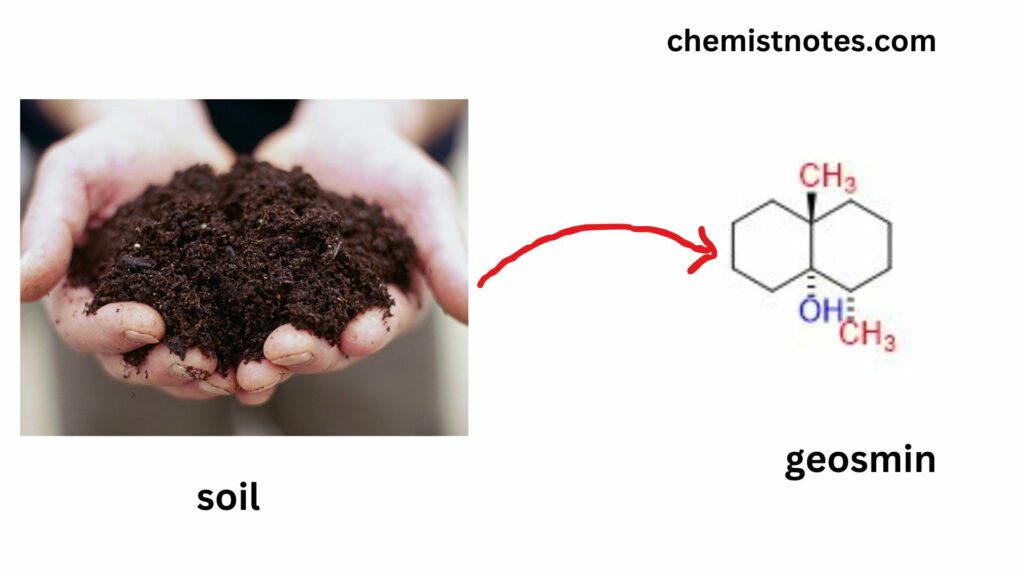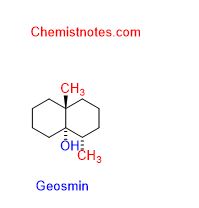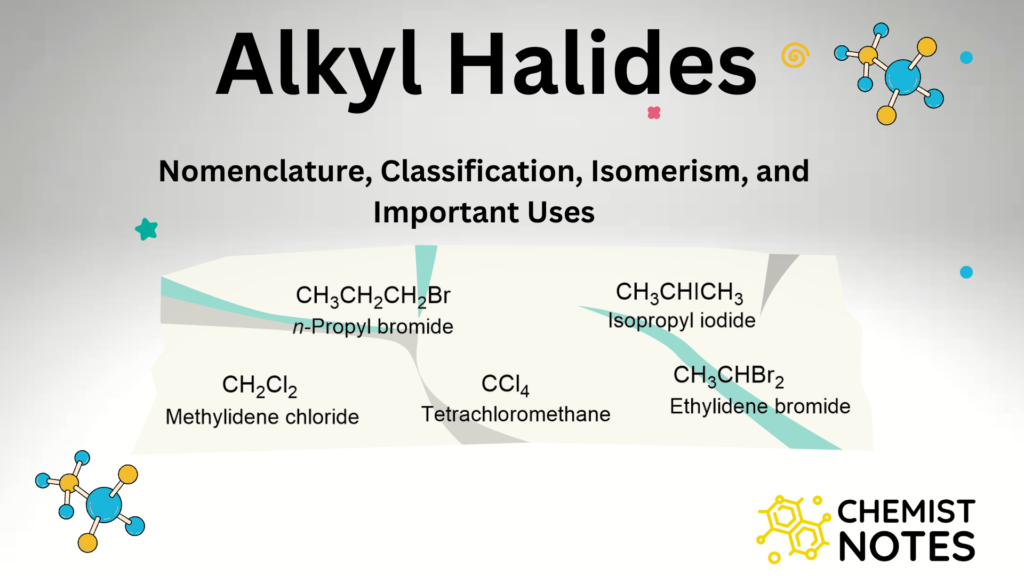Table of Contents
ToggleGeosmin is a chemical compound basically a monoterpene class and are responsible for the smell of soil that earthy smell. It has pungent odor. The IUPAC name of geosmin is octa hydro-4 alpha, 8 beta-dimethyl-4 alpha (2H)-naphthol. They are naturally found in Coffee arabica, Beta vulgaris. The molecular formula of geosmin is C12H22O. They fall in bicyclic terpene, and are colorless liquid having characteristics aromatic odor.

Geosmin
Have you wonder, what is the reason behind the smell of these rain, soil, those earthy smell? Why they smell like that? I personally loved the smell of those soil, those earthy vibes. Well, we can appreciate Streptomyces (soil bacteria) for making chemical called geosmin.
History of Geosmin
In early 1968, the word geosmin comes from two Greek word Ge means earth and Osme means odor. The primary component responsible for the soil’s odor was not identified until 1965 by Gerber and Lechevalier, who called it “geosmin” (from the words “Geo” for Earth and “Osme” for odor). The fragrance of the soil was first studied in 1891. The geosmin structure was then shown by Gerber in 1968.
What is Geosmin?
It is a beautiful smell of soil and have earthy scent. Often associated with group of soil bacteria called actinomycetes including Streptomyces spp. and Nocardia spp.

Origin of geosmin
They can be found in mostly in soil beside the soil, they can be found in lakes, river, wine, fish, carrots, mushrooms, etc. Numerous filamentous bacteria belonging to the family Actinomyces and blue-green algae (cyanobacteria), along with a few other prokaryotes and eukaryotes, produce geosmin. Anabaena, Phormidium, and Planktothrix are the principal cyanobacteria genera that have been demonstrated to make geosmin, whereas Streptomyces is the principal Actinomyces genus that does the same.
Why do microbes make geosmin?
In past years, people don’t really know about this chemicals. In 2020, scientists discovered that this chemical is beneficial for Streptomyces. They produce this chemical to allure tiny invertebrates, called springtails in soil to carry their spores and help in reproduction.
Difference between Petrichor/Geosmin
| Petrichor | Geosmin |
| Smell that comes after rain | Smell that comes after soil |
| Petra-stone ichor- fluid flows | geos-earth osme-smell |
Interesting facts about geosmin
Earthy in scent, geosmin is a naturally occurring bicyclic terpene. It is the “primary volatile component of beet essence, also… the strong earthy odor contaminant of fish, beans, [and] water,” according to The Merck Index. It is detectable by the human nose at as low as 5 parts per trillion in the air.
Geosmin remediation in drinking water
Standard treatment procedures are unable to eliminate geosmin from water, according to municipal water treatment facilities. Additional treatment is necessary to treat for geosmin, and not all municipal water suppliers may be able to provide it. Although not many research have been done specifically addressing this issue, activated carbon filters could be able to aid to some extent.
MCQs/FAQs
Is geosmin an enzyme?
In addition to odd tastes in food and drink, geosmin is the cause of the distinctive smell of damp soil. An enzyme found in the soil bacterium Streptomyces coelicolor A32, encoded by the SCO6073 gene, produces geosmin from farnesyl diphosphate (FPP, 2).
Is geosmin in rain?
A chemical substance known as geosmin is produced by millions of microorganisms living in that soil. “As rain hits the soil it generates these aerosols, this fine mist of droplets that get into the air that carry this bacterially produced geosmin with it,” UC Davis plant pathologist Dr.
Is geosmin bacteria?
Geosmin is a chemical compounds produces from soil bacteria.
Is geosmin organic?
When present in extremely low amounts, geosmin, a naturally occurring organic molecule generated by some species of cyanobacteria and actinomycetes, gives water an earthy stench.
Who can smell geosmin?
Human beings. The fact that humans are more sensitive to the scent of geosmin than any other species is a startling revelation! Sharks are less sensitive to the scent of blood than humans are to that of geosmin.






